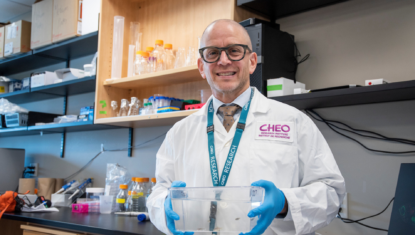23/09/2024
Ottawa, Ontario — Monday September 23, 2024

Current approaches to leukemia treatment look to improve outcomes by optimizing treatment after the malignancy is diagnosed. But what if there were opportunities for pre-emptive treatment?
To investigate this further, the CHEO research team at The Berman Lab, located at the University of Ottawa, focused on Shwachman-Diamond syndrome (SDS) – a type of inherited bone marrow failure syndrome (IBMFS). Children and youth with SDS are at a higher risk of developing myeloid leukemia.
In a recent study published in Leukemia, researchers detailed how they used zebrafish to model germline mutations in the recently identified SDS gene, DNAJC21. Their aim was to characterize the underlying disease biology, as well as identify therapies that could restore normal blood cell production and thereby prevent leukemia development.
Zebrafish are a versatile animal model and are highly suitable for studying blood disorders given their highly conserved hematopoiesis and amenability to genetic modeling. Furthermore, they allow for easy therapeutic screening as most drugs can simply be added to fish water.
By applying transcriptomic and metabolomic approaches to the DNAJC21 mutant zebrafish, the team determined that dysregulated nucleotide metabolism is one of the underlying causative factors for neutrophil loss. By giving the zebrafish treatment with nucleosides (uridine or thymidine) they were able to restore their neutrophil counts.
“I’ve been working with zebrafish for 22 years and it still amazes me how similar these tiny tropical fish are to humans – more than 70% of the proteins in the human body are the same as zebrafish. Through this study, we were able to determine that dysregulated nucleotide metabolism is one of the underlying causes of decreased neutrophil production in SDS patients. This suggests a promising therapeutic strategy for SDS patients that we can explore further,” said Dr. Jason Berman, CEO and Scientific Director of the CHEO Research Institute and the Vice President Research at CHEO.
Future research will include validation of the study findings in mice and patient-derived scientific models.
